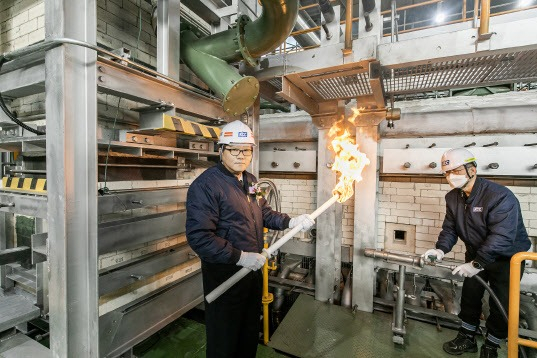Chemical Industry
KCC ramps up glass wool production capacity
A blow-in ceremony was held after completion of Munmak plant production line No. 1
By Dec 29, 2022 (Gmt+09:00)
1
Min read
Most Read
LG Chem to sell water filter business to Glenwood PE for $692 million


Kyobo Life poised to buy Japan’s SBI Group-owned savings bank


KT&G eyes overseas M&A after rejecting activist fund's offer


StockX in merger talks with Naver’s online reseller Kream


Mirae Asset to be named Korea Post’s core real estate fund operator



KCC Corp., a global applied materials chemical company, is accelerating its foray into the inorganic insulation material-based glass wool market.
The company said on Friday it had completed the expansion of the glass wool production line No. 1 at its Munmak plant in Gangwon Province and held a blow-in ceremony to place new embers in the furnace.
The event was attended by KCC Corporation Chairman Chung Mong-jin and KCC Construction Chairman Chung Mong-yeol, along with plant executives and staff, and officials from partner firms.
With the latest expansion, the No. 1 line will produce 100 tons of glass wool daily and 35,000 tons a year from January 2023. The Munmak plant was completed in February 1997, starting with Line No. 1 in April of that year, followed by Line No. 2 in 2002 and Line No. 3 in 2003, to become Korea's largest glass wool plant.
If the capacity of its Gimcheon plant is added to the Munmak plant's 100,000 tons, its total production capacity will reach 130,000 tons. In the second half of next year, the company will expand the Gimcheon plant's production capacity by about 50,000 tons.
KCC embarked on expanding its glass wool production capacity in response to rising demand for inorganic insulation materials after revision of the country's building law. The revised law, which raised performance standards for the flame retardant used in building finishing materials, began to be enforced this year.
Glass wool is one of the widely used inorganic insulation materials created by melting inorganic fibers such as silica sand at high temperatures into wool and then forming them into varied shapes such as rolls, boards, panels, covers (heat insulation boxes), and mats.
Unlike organic insulation materials made from petrochemical raw materials, glass wool does not emit pollutants and has excellent insulation and non-combustible properties.
"By installing a wet electrostatic precipitator, we can eliminate blue smoke throughout the plant and introduce a new technology such as the ceramic catalyst bag filter with high desulfurization and denitrification efficiency, to run the furnace in a more environmentally friendly way," said a KCC official.
Write to Byung-Keun Kim at bk11@hankyung.com
More to Read
-
 Chemical IndustryKCC's paint selected as World-Class Product for 14 consecutive years
Chemical IndustryKCC's paint selected as World-Class Product for 14 consecutive yearsDec 16, 2022 (Gmt+09:00)
1 Min read
Comment 0
LOG IN


